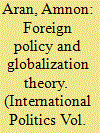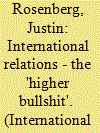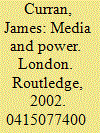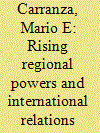|
|
|
Sort Order |
|
|
|
Items / Page
|
|
|
|
|
|
|
| Srl | Item |
| 1 |
ID:
108380


|
|
|
|
|
| Publication |
2011.
|
| Summary/Abstract |
Since the early 1990s, international relations has witnessed a stimulating debate on globalization. This debate laid the foundations for globalization theory (GT), providing the tools for an empirical examination of the globalization of multiple activities: from politics and organized violence, to finance, trade and production, through culture and environmental degradation. However, examination of what appear to be the best-known works on globalization reveals that foreign policy has been virtually excluded from GT. In this context, based on what is described here as a synergistic transformationalist approach (STA) to globalization, I provide a critique of GT. The critique is geared towards examining why foreign policy hitherto has been overlooked by contemporary GT. I expose the problems this generates and address them by exploring how STA enables GT to incorporate foreign policy. I use the case of Israel heuristically to elicit how incorporating foreign policy into GT may provide a better understanding of the relationship between foreign policy and globalization. Three themes are highlighted: the role of foreign policy in inducing and reproducing globalization; determining the mutually constitutive relationship between globalization and the state; and shaping the interfacing between international politics and globalization.
|
|
|
|
|
|
|
|
|
|
|
|
|
|
|
|
| 2 |
ID:
077897


|
|
|
|
|
| Publication |
2007.
|
| Summary/Abstract |
This article replies to an earlier forum (International Politics (42.3) on 'Globalization Theory: a Post Mortem'. Whereas the 'Post Mortem' had criticized Globalization Theory largely for its neglect of Classical Social Theory's achievements, the current paper emphasizes its reproduction of one of Classical Social Theory's greatest limitations: the failure to incorporate 'the international' into its theorization of historical development. This limitation, it is argued, may be overcome using the idea of 'uneven and combined development', an idea which is first reformulated (in order to re-connect the premises of social and international theory), and then used as a vantage point from which to respond to criticisms of the 'Post Mortem'. 'The international', it turns out, is not the fading reality postulated by Globalization Theory but rather a fundamental dimension of social existence that IR, uniquely among the social sciences, encounters as its core subject matter
|
|
|
|
|
|
|
|
|
|
|
|
|
|
|
|
| 3 |
ID:
046879


|
|
|
|
|
| Publication |
London, Routledge, 2002.
|
| Description |
x, 308p.
|
| Standard Number |
0415077400
|
|
|
|
|
|
|
|
|
|
|
|
Copies: C:1/I:0,R:0,Q:0
Circulation
| Accession# | Call# | Current Location | Status | Policy | Location |
| 046204 | 070.1/CUR 046204 | Main | On Shelf | General | |
|
|
|
|
| 4 |
ID:
153542


|
|
|
|
|
| Summary/Abstract |
This article explores Brazil and India's alternative paths in their search for great-power status. It examines the competing expectations of alternative IR theories regarding the conditions for great-power status in the post-Cold War era and their limited explanatory and predictive power. Although constructivism offers a more sophisticated approach, one also needs insights from realism/neorealism, neoliberal institutionalism, and globalization theory to understand the possibilities and limitations of the Brazilian and Indian strategies to be admitted to the great-power club. The article compares Brazil and India's foreign policies and nuclear diplomacy and challenges the idea that India's status as a nuclear weapon state enhances its prospects for joining the great-power club. Brazil does not possess nuclear weapons, but it has successfully created a consensual hegemonic regime in South America, which allows it to use a regionalist project (Mercosur, UNASUR) as a launching pad to gain admission to the great-power club. In contrast, despite possessing nuclear weapons, India has been unable to establish a consensual hegemonic regime in South Asia, and its “Pakistan problem” holds back her prospects for joining the great-power club. The article argues that a US blessing may not help India to gain entrance to the “board of the world” if other board members, such as China, resist India's admission. The conclusion examines the implications for IR theory of Brazil and India's alternative pathways to great-power status, and the impact of progress—or lack of progress—in global nuclear disarmament negotiations on both countries' possible admission to the great-power club.
|
|
|
|
|
|
|
|
|
|
|
|
|
|
|
|
| 5 |
ID:
079938


|
|
|
|
|
| Publication |
2007.
|
| Summary/Abstract |
This essay examines a proposition made in the literature that there are three waves in globalization theory-the globalist, skeptical, and postskeptical or transformational waves-and argues that this division requires a new look. The essay is a critique of the third of these waves and its relationship with the second wave. Contributors to the third wave not only defend the idea of globalization from criticism by the skeptics but also try to construct a more complex and qualified theory of globalization than provided by first-wave accounts. The argument made here is that third-wave authors come to conclusions that try to defend globalization yet include qualifications that in practice reaffirm skeptical claims. This feature of the literature has been overlooked in debates and the aim of this essay is to revisit the literature and identify as well as discuss this problem. Such a presentation has political implications. Third wavers propose globalist cosmopolitan democracy when the substance of their arguments does more in practice to bolster the skeptical view of politics based on inequality and conflict, nation-states and regional blocs, and alliances of common interest or ideology rather than cosmopolitan global structures
|
|
|
|
|
|
|
|
|
|
|
|
|
|
|
|
|
|
|
|
|